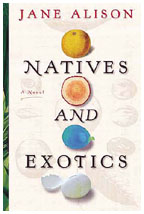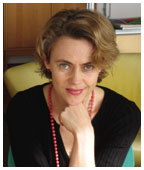| Have an opinion about this issue of PAW?
Click here for our online survey. |
September 14, 2005: Reading Room
Novelist Jane Alison ’83 follows three generations and their intense relationship with the land. (Courtesy Harcourt Inc.) |
Searching
for roots
People and plants in Jane Alison ’83’s novel move
about the globe
The daughter and stepdaughter of diplomats, Jane Alison ’83 grew up in Australia, South America, and the United States, and today lives in Germany. Her international background echoes in her latest novel, Natives and Exotics, which follows three generations of a family as they move about the globe, searching for a sense of home and pondering their relationship with the natural environment.
Alison, known as Jane A. Shumate at Princeton, got the idea for her novel when she house-sat for friends in the Portuguese Azores, volcanic islands in the Atlantic. She visited one of the islands’ wild gardens filled with exotic plants brought over in the early 1800s from Australia, New Zealand, and other locations. She learned that a Scottish gardener laid out the garden during a time when the British sent people all over the empire to collect and classify vegetation, and then had those specimens transplanted around the world. “I became very conscious of plants and people traveling and transforming the globe’s surface as they go,” says Alison, whose novel was published by Harcourt in May.
 One
of the main characters in Natives and Exotics, George, is based
on the Scottish gardener. He travels to the Portuguese Azores in 1822
and creates a garden with exotic trees and plants. He ends up introducing
a disease that spreads from tree to tree. After the blight, George sails
for South Australia.
One
of the main characters in Natives and Exotics, George, is based
on the Scottish gardener. He travels to the Portuguese Azores in 1822
and creates a garden with exotic trees and plants. He ends up introducing
a disease that spreads from tree to tree. After the blight, George sails
for South Australia.
The novel, however, begins in 1970 with the story of George’s descendant, 9-year-old Alice. She spends about a year in Ecuador, where her stepfather, an American diplomat, has a hand in despoiling the land. A whale tooth she brings from one diplomatic posting to another seems to keep her grounded, as do thoughts of her Australian father. Next the novel travels back in time to 1929, when Alice’s grandmother, Violet, has moved from the city of Adelaide into the bush of Australia. Pregnant with Alice’s mother, Violet ruminates on her family history and her connection to the earth as she digs up roots to clear the land.
Aspects of the novel are autobiographical. Alison, like Alice, was born to Australian parents and lived in Ecuador. Alison’s family, like Violet’s, settled in Adelaide. Violet is a composite of two grandmothers and a great-aunt, says Alison.
A classics major, Alison has written two other novels, The Love-Artist (2001) and The Marriage of the Sea (2003). Her prose has been called poetic and lyrical. Alison, who says she applied to Princeton after reading This Side of Paradise, didn’t really begin writing until age 28 — when she rewrote a children’s story she was illustrating for an art course. After working at newspapers in Washington, D.C., and Miami, and as a speechwriter at Tulane University, she earned an M.F.A. at Columbia in 1993. She moved to Germany eight years ago.
The main characters in Natives and Exotics ultimately realize that no one belongs anywhere in particular. “You find yourself living in a certain place and time with whatever history that there is behind you,” Alison says. “You can’t do anything about it. It is arbitrary.”
By K.F.G.
BOOK SHORTS
 Robert’s Rules of Writing: 101 Unconventional Lessons Every Writer
Needs to Know — ROBERT MASELLO ’74 (Writer’s
Digest Books). The author aims to help writers improve their work, save
time, and get the job done in this witty book for journalists, fiction
and nonfiction writers, screenwriters, and business people. Masello’s
rules include “Befriend your editor” and “Keep your
day job.” Masello is a novelist, journalist, and TV writer.
Robert’s Rules of Writing: 101 Unconventional Lessons Every Writer
Needs to Know — ROBERT MASELLO ’74 (Writer’s
Digest Books). The author aims to help writers improve their work, save
time, and get the job done in this witty book for journalists, fiction
and nonfiction writers, screenwriters, and business people. Masello’s
rules include “Befriend your editor” and “Keep your
day job.” Masello is a novelist, journalist, and TV writer.
 Shaking Her Assets — ROBIN EPSTEIN ’95 and RENÉE
KAPLAN ’95 (Berkley). In this funny novel set in New York City,
copywriter Rachel Chambers loses her job and her boyfriend. Eventually,
Rachel lands a job through a temp agency and starts a consulting company
on the fly. When a colleague creates a comic book superhero based on her
misadventures, she gathers the energy to try to right her life. Epstein
has written for TV; Kaplan is a producer for 60 Minutes.
Shaking Her Assets — ROBIN EPSTEIN ’95 and RENÉE
KAPLAN ’95 (Berkley). In this funny novel set in New York City,
copywriter Rachel Chambers loses her job and her boyfriend. Eventually,
Rachel lands a job through a temp agency and starts a consulting company
on the fly. When a colleague creates a comic book superhero based on her
misadventures, she gathers the energy to try to right her life. Epstein
has written for TV; Kaplan is a producer for 60 Minutes.
 Beyond Oil: The View from Hubbert’s Peak — KENNETH
S. DEFFEYES *59 (Hill & Wang). The author explores some of the far-reaching
consequences of his conviction that world oil production will peak around
Thanksgiving Day 2005 and then steadily decline, never to rise again.
Deffeyes looks at the supply of potential replacement fuels, including
natural gas, coal, tar sands and heavy oils, oil shale, uranium, and hydrogen.
Deffeyes is a professor of geosciences, emeritus, at Princeton.
Beyond Oil: The View from Hubbert’s Peak — KENNETH
S. DEFFEYES *59 (Hill & Wang). The author explores some of the far-reaching
consequences of his conviction that world oil production will peak around
Thanksgiving Day 2005 and then steadily decline, never to rise again.
Deffeyes looks at the supply of potential replacement fuels, including
natural gas, coal, tar sands and heavy oils, oil shale, uranium, and hydrogen.
Deffeyes is a professor of geosciences, emeritus, at Princeton. ![]()
By K.F.G.
For a complete list of books received, click here.

